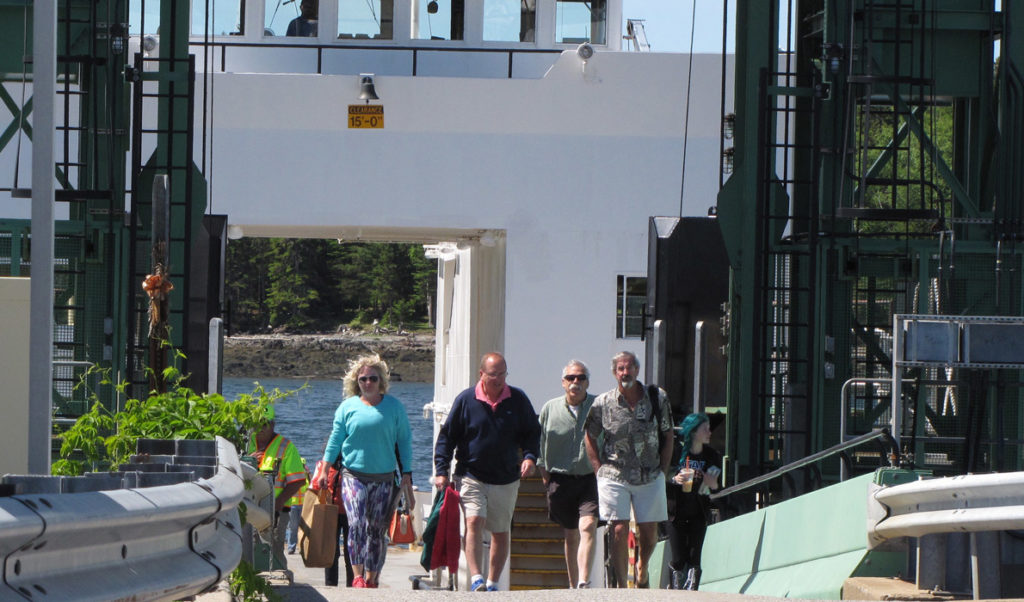Sometimes it’s important to begin by stating the obvious. Ferry service is not optional for island communities—they live or die by it.
The allocation of resources across the islands served by the Maine State Ferry Service tends to divide, rather than unite communities. Islesboro is the clear loser in the latest round.
With only a few weeks notice, rates are more than doubling. There is no doubt the new fares represent a significant and unanticipated financial burden for the community. From families who need to bring their children to doctors to teachers who commute from the mainland every day, the speed and magnitude of the rate increase threaten to upend life as they know it.
The three other islands with daily service—Swan’s, Vinalhaven, and North Haven—have paid rates over the last decade at levels close to the new fares Islesboro is facing and remain thriving, year-round communities. Community institutions are forged around the ferry schedule, businesses operate with an eye towards the ferry schedule, and residents plan trips to the mainland to maximize their time ashore. They are happy their rates didn’t skyrocket and upend their lives.
The ferry service is far from perfect. Getting a truck from the mainland to North Haven and back takes planning and patience. On Swan’s Island, elders living on a fixed income will face a tough choice between paying a higher reservation fee or dealing with complicated line-up logistics to make sure they can keep doctor appointments.
Each community has a complex relationship with “its” ferry and the MSFS, but fundamentally, the ferry is as much a part of each community and its identity as the school. Being one step removed from the direct and immediate impact of these decisions, coupled with close relationships in each community, gives the Island Institute a different perspective on the ferry service.
The ferry service is part of the civic infrastructure that shapes island life and helps define communities. The ferry is not just a means of conveyance, rather it is a strand in the fabric of civil society and helps connect people to their government. The ferry shapes not only island communities but helps to inform and shape the economy on the mainland.
The ferry also is a source of long-term risk to island communities. Changes in ridership directly impact MSFS revenue but have less bearing on operating costs.
Between July 2014 and June 2015, the Islesboro ferry carried 202,000 passengers and 83,000 cars, 42 percent and 49 percent, respectively, of total service ridership. If there is a 15 percent reduction on the Islesboro run—if 12,000 fewer vehicle tickets and 31,000 fewer passenger tickets are sold—the ferry service will face a $700,000 revenue shortfall, which is comparable to the original shortfall that triggered the new rate structure.
Maybe the lower fares for those originating on the mainland will make up this difference, maybe not. Either way, the financial future of the MSFS is closely tied to the Islesboro run.
Because ferry service pervades every aspect of island life, there is a dramatic element that makes these discussions difficult. But the intensity of this anxiety has led to thinking creatively about how this need gets met.
The Casco Bay Lines is a public-private partnership that serves the islands in that bay. Even though Casco Bay Lines serves Chebeague, a group of Chebeague islanders run the non-profit Chebeague Transportation Company that better meets their community commuter needs. Isle au Haut Boat Company was the first ferry service that became a non-profit; year-round and seasonal residents work together to oversee the service. Monhegan and the Cranberry Isles have privately owned ferry services.
Island communities are equipped to solve transportation challenges. In recent years they’ve built renewable energy systems, broadband networks, and in some cases, they’ve taken control of their transportation needs. We suspect it won’t be long before serious questions about how ferry service can better sustain island communities are raised.
Nick Battista is the Island Institute’s policy officer, and is the guest author of the Field Notes column, which is usually written by Rob Snyder, the Island Institute’s president.





